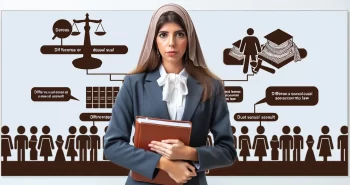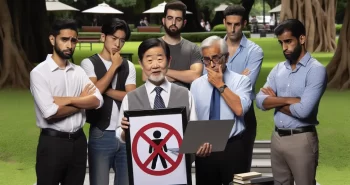When an Unwanted Kiss Qualifies as Sexual Assault and Legal Options for Survivors

s kissing sexual assault? This page explains when an unwanted kiss qualifies as sexual assault and how survivors can pursue legal action. It is intended for individuals considering civil or criminal legal options, not as medical or social advice. Learn what steps you can take to protect your rights and seek compensation.
Understanding Sexual Assault in Legal Terms
In legal lingo, any unwanted touch, including a peck, can be tagged as sexual assault. Consent’s the name of the game here—it’s all about clear lines, firm handshakes, and everyone understanding what’s up. California lays it out real plain: consent means sayin’ yes fully, no fingers crossed, and knowing exactly what’s goin’ down. If someone’s too young, muddled, or under pressure, they flat out can’t say yes legally.
When a Kiss is Considered Sexual Assault
Law books got it that planting one on someone’s cheek without a “yes” can get flagged as sexual battery or harassment, depending on how things roll out. Every state’s got its dance moves when it comes to laws on this, so it pays to know what the score is wherever you’re hangin’ out.
Legal Scenarios Where Unwanted Kisses Are Assault
Forget the law for a sec—uninvited kisses can mess with someone’s head big time. It’s a slam against personal space and can send someone spiraling into a mental tailspin, shaking up their sense of safety and trust.
Factors That Elevate a Kiss to Sexual Assault
There’re a few situations where kisses turn into something much nastier, like:
- Planting one when someone’s outta it and can’t say “yes.”
- Kissing a minor, who legally can’t okay such moves.
- Forcing a kiss when someone’s arm’s twisted, so that “yes” ain’t real.
To stop any unwanted puckering up or worse, talk straight and respect spaces. It’s about stickin’ up for what’s yours and makin’ sure everyone’s on the same page whenever you’re interacting.
Knowin’ When to Ring the Bell
If someone’s been on the sharp end of an unwanted kiss or an assault, they can hit the legal avenue. Callin’ up the cops, or heading down the civil suit route might be an option where the bar ain’t as high as a criminal case to get their justice and maybe some coin for their troubles.
If you’re caught in the mess of sexual assault or an unwanted touch, having a sit down with folks like the lawyers at Greenberg Gross from Fight for Survivors in California might help you get through the legal maze, stand by you, and fight your corner through civil cases.
Table of Contents:
Defining Sexual Assault
Let’s break down what sexual assault means, especially focusing on consent and respecting boundaries. It’s not just about understanding terms; it’s about treating people with kindness and dignity.
What Constitutes Consent?
Let me be clear: in any kind of romantic contact, like kissing, without an obvious “yes,” it can fall under sexual assault. Consent isn’t just about a nod; it’s about a clear and shared understanding. In California, the law says consent must be a “positive cooperation in act or attitude,” meaning you really have to want to do it and know what you’re getting into. If someone’s under 18, can’t think straight due to substances, or feels forced or scared, they can’t give real consent.
Sexual interactions can get confusing, and that’s why it’s so important to talk about consent. It’s about respecting each other enough to know when to step back. The idea of consent is like a bright spotlight showing the way to a space where everyone feels safe and respected.
By taking a close look at consent, we can help build relationships where everyone feels heard and respected. Teaching and learning about consent isn’t just a good idea—it’s necessary if we want to live in a world where people look out for each other.
Kissing and the Law
So, you’ve got questions about what kissing can legally get you into, right? Let’s break down the basics and see why a peck on the cheek isn’t always that harmless. From the legal mumbo-jumbo about sexual battery to the quirks of state laws, there’s more to navigate than a first awkward kiss at the school dance.
Legal Meanings Behind Sexual Battery and Harassment
Yeah, bet you didn’t guess kissing without a thumbs-up could lead to legal drama. In the legal world, stealing a smooch without the other person’s nod is a big no-no, possibly slipping into the territory of sexual assault. It all ties into fancy terms like “sexual battery” or “harassment.” Battery, depending on where you are, usually means someone got touched without wanting it. If a surprise kiss falls under this “offensive touching,” you could be on shaky ground in legal court.
State Laws and Variations
Like trying to find your favorite spread in a thrift shop, state laws can be all over the place when it comes to what counts as sexual harassment or battery. Take California, for example. Over there, giving consent isn’t just nodding your head; it’s about full-on, eyes-wide-open, mutual agreement. You can’t pin anyone saying “yes” if they’re under 18 or not in their right mind, or if they’re feeling the pressure or scared.
In the same state, there are time limits on when survivors can file lawsuits for sexual assault. Thanks to a legal change in 2020 (hello, Assembly Bill 218), folks who went through childhood abuse have more time to seek justice now.
Knowing how the law frames kissing and other not-so-welcome sexual advances is crucial for keeping one’s rights intact and pushing for fairness. Whether it’s wrestling with the tricky language of state laws, reporting an unwanted kiss, or thinking about dragging someone to civil court for it, being clear on what you can legally do is key to handling these uncomfortable situations.
The Impact of Unwanted Kisses
When we talk about the effect of those kisses nobody asked for, it’s all about the emotional bruises and the challenge to personal space that they bring along.
Emotional and Psychological Harm
Getting an unwanted kiss isn’t just a bad moment—it can mess with your head in a big way. Groups like RAINN are all about shielding folks from this kind of harm, lending a hand to those who need it, and making sure those responsible are held to account. The emotional fallout might leave you feeling scared, ashamed, guilty, or anxious. Trust and intimacy? Yeah, they might take a hit too, affecting how you relate to others down the road.
And it doesn’t stop there—the psychological scars can transform into disorders like PTSD and depression. If you or someone you know has been on the receiving end of an unwanted kiss, reaching out to counselors or support groups can be key to regaining peace of mind.
Violation of Personal Boundaries
A kiss without “Yes, I want this” is a straight-up trespass into someone’s personal bubble, a time-bomb of disrespect. It stretches past the physical touch, attacking someone’s autonomy and dignity. Legally speaking, acts like these fall under the umbrella of sexual assault, any kind of unwanted touch or attention that wasn’t invited.
Take California’s Assembly Bill 218 as an example: folks in California who’ve had their boundaries crossed this way have up to ten years to file a lawsuit, or three years from when they figured out what happened, thanks to laws set in 2020. It’s a small step in caring for those who faced such things as kids but want justice as adults.
Recognizing unwanted kisses for the violations they are—shoving past emotional and psychological fences—helps in creating a world where everyone’s space and choices are respected. We’re aiming toward a society that champions consent, respects each person’s choices, and upholds human dignity.
Situations Where Kissing Can Be Considered Assault
When it comes down to it, a kiss should never be something that causes discomfort or crosses boundaries. But in some scenarios, that line between what’s okay and what’s not gets blurry, and it’s important to put things straight. A kiss can definitely fall into the category of sexual assault if it’s done without consent—like unwanted touching or fondling. Let’s take a closer look at when a simple kiss steps into the wrong territory.
Kissing Someone Who is Incapacitated
Imagine someone is too drunk, fast asleep, or out cold for any reason and can’t say yes or no to a kiss. That’s a big red flag right there. It’s never okay to engage in any intimate contact when someone isn’t capable of giving a clear thumbs-up. Simple as that. It’s essential to make sure everyone involved understands and agrees to what’s going on.
Kissing a Minor
Now here’s a solid rule: kids are off-limits. They’re not old enough to legally give the kind of consent needed for anything more than what’s appropriate for their age. So kissing someone who hasn’t reached the age of consent? That’s not just ethically wrong—it’s illegal. The age at which someone can legally consent varies depending on where you are, but it’s key to play it safe and stick to those legalities.
Kissing Under Coercion or Duress
A kiss that’s squeezed out of someone using pressure tactics? That’s not consent, folks. Whether it’s through threats, manipulation, or anything else that twists arms, it loses all sincerity and falls into unwanted territory. When fear or pressure is involved, there’s no real choice being made. Genuine consent means saying yes because you truly want to, not because you’ve been pushed into a corner.
Understanding and respecting where consent begins and ends isn’t just polite—it’s an absolute must in any relationship, especially when things get intimate. Being clear, respectful, and ensuring that every party involved is on the same page prevents unwanted situations from developing. If you’re in doubt about what counts as legal or how to seek help, check out sections here about getting legal advice on sexual battery and harassment.
Protecting Yourself and Others
When it comes to sexual assault, the name of the game is communicating openly, respecting boundaries, and having a rock-solid understanding of consent. This isn’t just about being polite—it’s about building a society where everyone feels safe and accountable.
Talking it Out
Organizations like RAINN, which stands for Rape, Abuse & Incest National Network, are big on the whole communication thing. They’re all about making sure we have those important talks about what we want, what we don’t want, and making sure everyone is on the same page. This isn’t just small talk—it’s the key to healthy relationships.
Having a clear conversation means everyone knows where they stand. It helps nip misunderstandings in the bud, fosters respect, and builds a network of accountability. Setting boundaries and nabbing that clear “yes” are crucial steps for interactions loaded with mutual respect.
Legal Requirements for Consent
When it comes to sexual assault, one thing’s for sure: actions like surprising someone with a kiss without their go-ahead? They fit the bill for sexual assault. Uninvited touching or fondling? That’s a serious breach of someone’s personal space and freedom.
Consent is the bedrock of good relationships. Look at California’s take on it: Consent is all about “positive cooperation in act or attitude pursuant to an exercise of free will… freely and voluntarily and have knowledge of the nature of the act or transaction involved.” It’s all about saying “yes” with full awareness and willingness.
Respecting boundaries and understanding consent is not just a “nice to have”—they’re essential practices for creating a world that puts safety and dignity front and center. By sticking to these principles, we help stop sexual assault in its tracks, boost responsibility, and create spaces where everyone is treated with the respect they deserve.
By championing the necessity of clear communication and valuing boundaries and consent, each person can help tackle sexual assault and nurture a community that cherishes mutual respect, dignity, and autonomy for all.
Seeking Legal Recourse
Dealing with the fallout from unwanted acts, like a non-consensual kiss that borders on sexual assault, can be overwhelming, but understanding your legal rights is a necessary part of moving forward. You’ve got a couple of main paths here: reporting the incident to law enforcement or taking the civil case route to seek damages.
Reporting to Law Enforcement
If you’ve dealt with unwanted kissing or another type of sexual assault, telling law enforcement is a significant step in making sure the person responsible faces the music. Take California, for instance: Consent isn’t some vague idea but is seen as a clear agreement to the act, free from pressure or misunderstanding. Remember, anyone under 18, or those who are impaired or coerced, can’t legally give consent.
By bringing law enforcement into the picture, you’re getting the ball rolling on a full-scale investigation that could lead to criminal charges against the individual. These authorities are trained to handle sensitive cases with the utmost care, keeping your rights top of mind throughout. And if you’re feeling a little lost in the legal maze, attorneys who focus on sexual assault cases, like the folks over at Greenberg Gross’s Fight for Survivors in California, are ready to help guide and represent you on this journey for justice.
Civil Lawsuits for Damages
Survivors can also pursue justice by filing civil lawsuits to recover damages sustained from the assault. In California, if you’re an adult survivor, you have up to ten years to kick off a civil action after the incident, or three years post-realization of the assault. Thanks to California Assembly Bill 218 from 2020, survivors of childhood sexual abuse have even more time to file, acknowledging the unique difficulties with such cases.
Going the civil lawsuit route lets survivors aim for financial restitution for both tangible harms and the emotional toll the assault has taken. It’s also about getting acknowledgment of what you’ve gone through and seeing the perpetrator held accountable. This legal avenue helps survivors regain control over their lives and acts as a check against future assaults. Legal pros well-versed in sexual assault cases can have your back through the civil litigation process, making sure your voice is heard and supported throughout.










